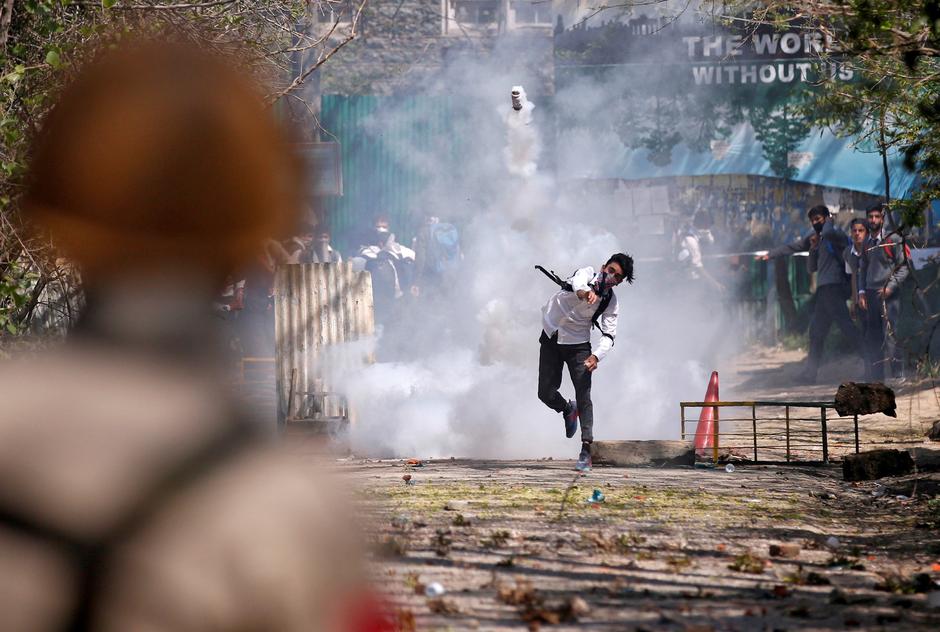Indian authorities have detained at least 300 politicians and separatists to quell protests in Indian-occupied Kashmir (IoK) over the withdrawal of its special status, a police officer, local leaders and media said on Thursday, in one of the biggest crackdowns in years.
Thousands of paramilitary police have been deployed in Srinagar, schools shut and roads and neighbourhoods barricaded.
Still, there have been sporadic protests, two police officers said speaking on condition of anonymity because of the sensitivity of the situation.
There has been stone-pelting in at least 30 places across Srinagar since Tuesday night, one of them said. At least 13 people have been admitted to the city's main government hospital with pellet injuries, he added.
So far, 300 political leaders, many campaigning for Kashmir's secession from India have been detained, a police officer said.
Two local leaders from the National Conference, a major regional party, also said that at least 100 politicians - including former state ministers and legislators - had been detained.
‘US knew India would rob Occupied Kashmir of special status’
They did not want to be named because of the sensitivity of the information. Two former chief ministers of the state are among those
detained, they said. India's
Mail Today newspaper said the number of politicians held in their homes, guesthouses was more than 400.
Mirwaiz Omar Farooq, chairman of the Hurriyat Conference, was also arrested on Tuesday for a few hours, but has since been detained at his home, a statement from his office said.
According to
AFP, 560 people have been rounded up in the latest crackdown in IoK, including university professors, business leaders and activists.
AFP cited reports by the
Press Trust of India and the
Indian Express which stated that 560 people were taken to makeshift detention centres - some during midnight raids - in the cities of Srinagar, Baramulla and Gurez.
The detentions came as Prime Minister Narendra Modi was set to address the nation on the radio later on Thursday to explain his Hindu nationalist government's decision to revoke the seven-decade long special status of the disputed region through a presidential decree.
Since Sunday, the government has shut down mobile networks, the internet and banned public gatherings in the largest city, Srinagar, after stripping the Muslim majority region of the right to make its own laws and lifting a decades-old ban on people from outside the state from buying property there.
Indian soldiers patrol silent streets after occupied Kashmir curfew
On Wednesday evening, Srinagar's old quarter was locked down, with policemen in riot gear deployed every few metres, and barbed-wire checkpoints every few hundred metres.
Near the Jamia Masjid, which has long been the centre of protests in Srinagar, bricks and rocks from recent stone pelting incidents were strewn in at least three locations.
A witness said that there had also been stone-pelting in Bemina area in northwest Srinagar, where some roads had been blocked by poles and boulders.
"There is a lot of anger among the people," one of the police officials said.
Experts warn that the valley is likely to erupt in anger at the government's shock unilateral move once the restrictions are lifted, which could come as soon as the Muslim festival of Eid on Monday.
Late on Wednesday, India's aviation security agency advised airports across the country to step up security as "civil security has emerged as a soft target for terrorist attacks" on the back of the Kashmir move.
Pakistan on Wednesday said it was downgrading diplomatic ties with Delhi. Islamabad has also vowed to take the matter to the United Nations Security Council.
New Delhi has insisted the ending of autonomy for the region is an internal matter.
Kashmiris see Modi's decision to withdraw the special status as a breach of trust and opening the way to flooding their region with people from the rest of India, eventually altering the demographics of the territory.



COMMENTS
Comments are moderated and generally will be posted if they are on-topic and not abusive.
For more information, please see our Comments FAQ